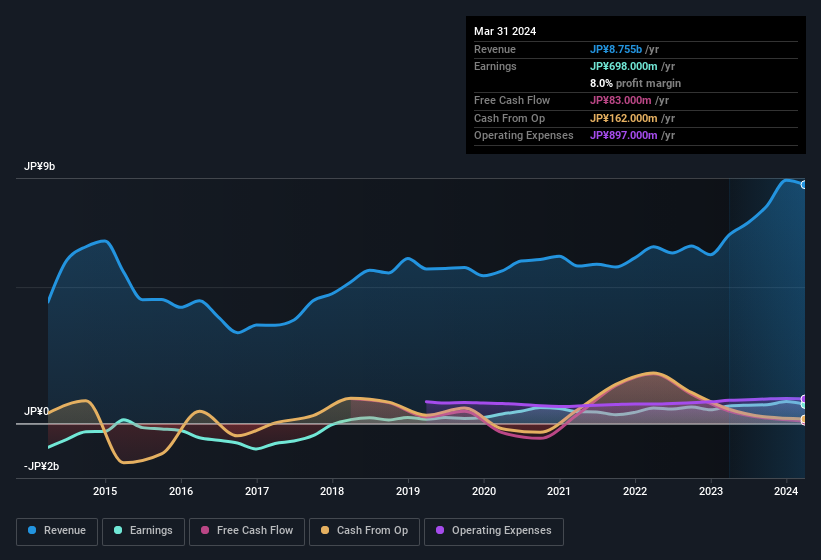Hamai's (TSE:6131) Shareholders May Want To Dig Deeper Than Statutory Profit

Hamai Company Limited's (TSE:6131 ) stock didn't jump after it announced some healthy earnings. We think that investors might be worried about some concerning underlying factors.
View our latest analysis for Hamai

Zooming In On Hamai's Earnings
One key financial ratio used to measure how well a company converts its profit to free cash flow (FCF) is the accrual ratio. To get the accrual ratio we first subtract FCF from profit for a period, and then divide that number by the average operating assets for the period. You could think of the accrual ratio from cashflow as the 'non-FCF profit ratio'.
Therefore, it's actually considered a good thing when a company has a negative accrual ratio, but a bad thing if its accrual ratio is positive. While it's not a problem to have a positive accrual ratio, indicating a certain level of non-cash profits, a high accrual ratio is arguably a bad thing, because it indicates paper profits are not matched by cash flow. Notably, there is some academic evidence that suggests that a high accrual ratio is a bad sign for near-term profits, generally speaking.
Hamai has an accrual ratio of 0.20 for the year to March 2024. Unfortunately, that means its free cash flow fell significantly short of its reported profits. In fact, it had free cash flow of JP¥83m in the last year, which was a lot less than its statutory profit of JP¥698.0m. Hamai's free cash flow actually declined over the last year, but it may bounce back next year, since free cash flow is often more volatile than accounting profits.
Note: we always recommend investors check balance sheet strength. Click here to be taken to our balance sheet analysis of Hamai.
Our Take On Hamai's Profit Performance
Hamai's accrual ratio for the last twelve months signifies cash conversion is less than ideal, which is a negative when it comes to our view of its earnings. Because of this, we think that it may be that Hamai's statutory profits are better than its underlying earnings power. But on the bright side, its earnings per share have grown at an extremely impressive rate over the last three years. At the end of the day, it's essential to consider more than just the factors above, if you want to understand the company properly. If you'd like to know more about Hamai as a business, it's important to be aware of any risks it's facing. For instance, we've identified 4 warning signs for Hamai (1 shouldn't be ignored) you should be familiar with.
Today we've zoomed in on a single data point to better understand the nature of Hamai's profit. But there is always more to discover if you are capable of focussing your mind on minutiae. For example, many people consider a high return on equity as an indication of favorable business economics, while others like to 'follow the money' and search out stocks that insiders are buying. So you may wish to see this free collection of companies boasting high return on equity, or this list of stocks with high insider ownership.
Valuation is complex, but we're here to simplify it.
Discover if Hamai might be undervalued or overvalued with our detailed analysis, featuring fair value estimates, potential risks, dividends, insider trades, and its financial condition.
Access Free AnalysisHave feedback on this article? Concerned about the content? Get in touch with us directly. Alternatively, email editorial-team (at) simplywallst.com.
This article by Simply Wall St is general in nature. We provide commentary based on historical data and analyst forecasts only using an unbiased methodology and our articles are not intended to be financial advice. It does not constitute a recommendation to buy or sell any stock, and does not take account of your objectives, or your financial situation. We aim to bring you long-term focused analysis driven by fundamental data. Note that our analysis may not factor in the latest price-sensitive company announcements or qualitative material. Simply Wall St has no position in any stocks mentioned.
About TSE:6131
Hamai
Manufactures and sells machine tools and parts in Japan and internationally.
Adequate balance sheet slight.
Market Insights
Community Narratives



